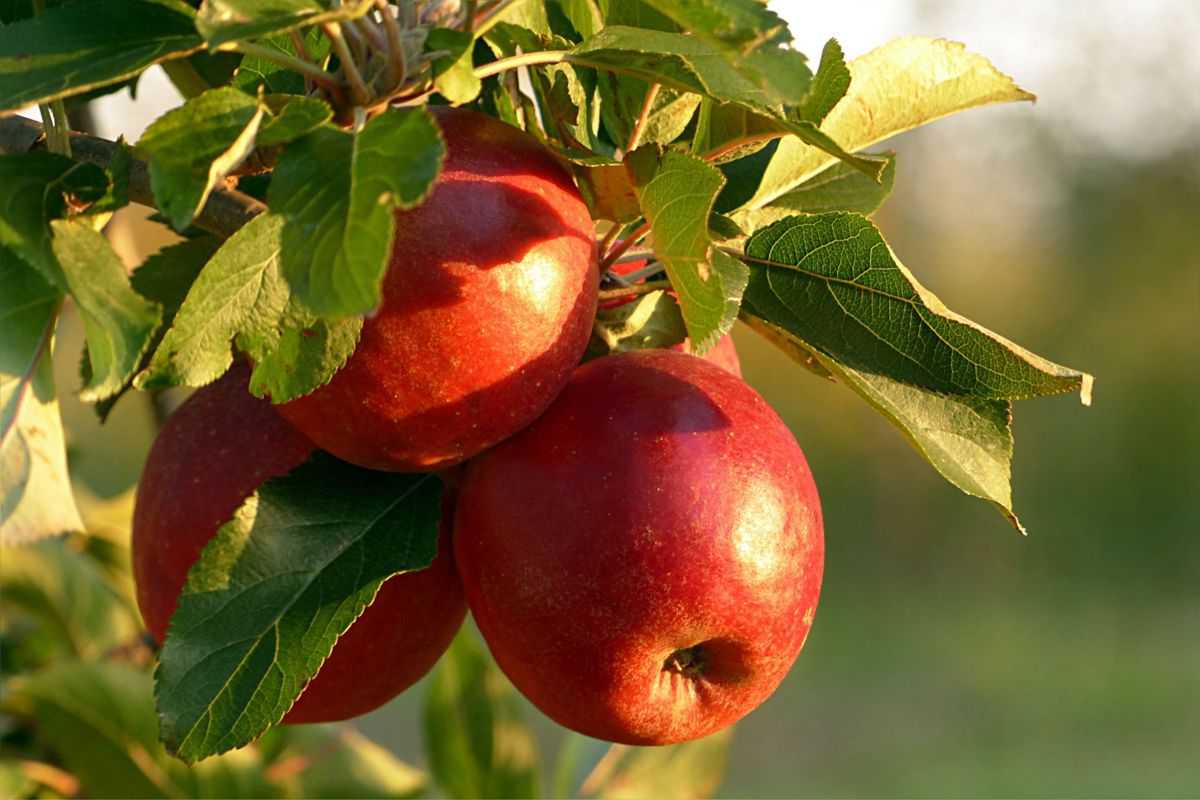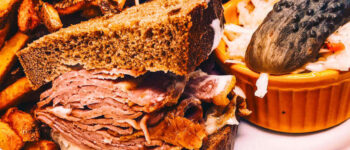↵ View All Produce Conversions
Many salad and dessert recipes call for “1 cup of mashed apples” or “1 cup of chopped apples” or even “1 cup of sliced apples” but it is not always straight forward to decipher actually how many apples are in a cup. In order to help make cooking easier we did some experiments to help tell you exactly how many apples you need to buy.
To answer How many apples in a cup we went to the grocery store to play in the produce section. After surveying the fruit we decided to use medium apples for our calculations and discovered that 1 pound of apples equals 3 to 4 medium apples. We bought a couple pounds of medium apples and headed home to start coring our stash.
We then started chopping and found it took 1.5 cored apples to reach the 1 cup mark. Next we mashed the apples to determine how many apples were needed to measure a cup. We found when mashed it took 2 whole apples. However, when measuring for 1 cup of sliced apples, just 1 apple did the trick.
Did you know that apples are actually a member of the rose family of plants? Even though the crabapple is the only apple native to North America, the red delicious apple is the most widely grown variety in the U.S. Ever wonder why apples float in water? They are made up of 25% air!
Next time your recipe calls for a cup of mashed or chopped apples you’ll know that you need to purchase 2 apples at the store. And how many apples are in a cup of sliced apples? You only need to buy 1 apple. You can also use our conversion tool below for any custom “how many apples in a…” measurements you need. If you are coring a lot of apples by hand you should definitely look into getting a good apple corer. Either the ORBLUE Stainless Steel Apple Corer or the OXO Good Grips Corer are inexpensive options that will hold up well and greatly speed up the process.

Custom Conversions for Apple
One Apple Equals
- There is ½ Cup (118 mls) of Cored and Mashed Apple in a Apple
- There is ¾ Cup (177 mls) of Cored and Chopped Apple in a Apple
- There is 1 Cup (237 mls) of Cored and Sliced Apple in a Apple
See more : How Many Tablespoons in a Cup (Tbsp to C)
I need: ¼ ½ ¾ 1 1 ½ 2 2 ½ 3 3 ½ 4 4 ½ 5 6 7 8 9 10 Teaspoon(s) Tablespoon(s) Fluid Ounce(s) in Volume Cup(s) Pint(s) Quart(s) Gallon(s) Milliliter(s) Liter(s) of Cored and Mashed Apple Cored and Chopped Apple Cored and Sliced Apple You need 2 Apples
Want a Fancy Cocktail?
Full Recipe: Smoked Manhattan Cocktail
How to Store Apple
General How to Store Apple Info
Refrigerate apples separately from vegetables because apples naturally release small amounts of ethylene gas that can damage lettuce and other produce.
Cut apples quickly turn brown; the use of ascorbic acid (vitamin C) is a common and effective treatment. Ascorbic acid can be purchased where canning supplies are sold; follow the directions on the package.
Short Term Apple Storage
Apples keep best in your refrigerator, preferably in the crisper drawer or in an unsealed plastic bag.
Cut or sliced apples should be covered and refrigerated if they are not eaten within 2 hours of preparation; this reduces browning and maintains quality.
Apple Long Term Storage
Do not try to store apples with bad spots or worm holes. Wrap each apple in a piece of newspaper; place several wrapped apples together in a plastic bag tied with a string or twisty. The plastic bag keeps the apples from drying out and the paper helps absorb moisture from any apple that may spoil. Store the plastic bags of apples in boxes in a cold storage area of 35 to 40°F (1.7 to 4.4°C). Apples stored this way will stay crisp and flavorful throughout the winter.
See more : Beer Alcohol Content ABV% of Popular & Craft Beer Brands
Freezing apples for use in future uncooked desserts, a syrup pack is recommended. Apples for cooked desserts can be prepared with either a sugar pack or unsweetened dry pack. In either case, apples can be stored in rigid plastic containers, plastic freezer bags, or glass jars made specifically for freezing. Apples will maintain a high quality for 8 to 12 months at 0°F (-17.8°C).
Apples are high in acid which inhibits the growth of bacteria, making them ideal candidates for canning.
Apples are considered excellent candidates for dehydrating. Dried apples can be stored in sealed plastic bags or airtight containers. The apples color, flavor, aroma, and nutritive value will start to decrease after a year. Well wrapped dried apples can be frozen; the quality and flavor will last for 2 years.
Apple Recipes
Looking for Something a Little Different?
Full Recipe: Citrus Cured Salmon Sous Vide
What is the Produce Converter?
One of the biggest hassles when cooking and working in the kitchen is when a recipe calls for “the juice of 1 lime” or a similar measurement. Often times when cooking people use bottled juices, pre-sliced vegetables and other convenient cooking time savers. Produce Converter will help you convert the “juice of 1 lime” and other similar recipe instructions into tablespoons, cups and other concrete measurements.
Produce Converter can also be used to figure out how many vegetables to buy when you need, for instance, “A cup of diced onion.” You can use our easy conversion tool to figure out exactly how many onions you need to buy at the store in order to end up with the amount you need for your cooking.
We hope you enjoy Produce Converter and if you have any suggestions for how we can improve it and make your cooking easier please let us know.
Nigel Gildon editor:Nigel Gildon is the editor of Chef Wayne’s Big Mamou: Chef Wayne’s Big Mamou. He has worked in the publishing industry for many years and has a passion for helping new authors get their work into the hands of readers. 63 Liberty Street * Springfield, MA 01003






